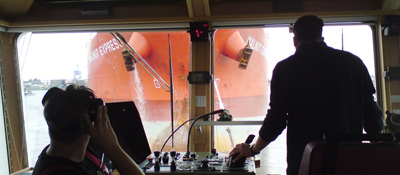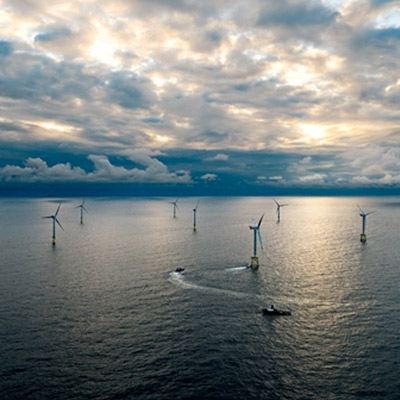Referat Nautik
Brandstwiete 1
20457 Hamburg
Oya Sönmez
Phone: +49 40 361 37-239
Fax: +49 40 361 37-204
Mobile: +49 171 88 53 239
Mail: oya.soenmez@bg-verkehr.de
BG Verkehr / Dienststelle Schiffssicherheit
Referat Schiffbau
Brandstwiete 1
20457 Hamburg

Gabriele Leuer
Phone: +49 40 361 37-249
Mail: schiffbau@bg-verkehr.de
Other craft • vessels
Small craft
Definition of small craft
A small craft is a cargo ship with a gross tonnage of up to 100 and a vessel length of at least 8 m, according to the German Ship Safety Ordinance ("Schiffssicherheitsverordnung").
Note:
According to the Schiffsbesetzungsverordnung (amendment of 23 June 2021), as merchant ships, commecially-used small craft require a Minimum Safe Manning Certificate, regardless of their length - this includes those with a ship's length of less than 8 m as well. Please apply with this application form.
Additionally, a Ship Safety Certificate is required for small craft with a length of 8 m and more.
Only small craft used non-commercially and for sport and recreational purposes are excluded from the application of the safety requirements for cargo ships and the load line requirements, according to the German "Schiffssicherheitsverodnung" (Ship Safety Ordninance - Annex 1a, Part 6, Chapter 1, Reg. 1.2.5 and Annex 1a, Part 7, Reg. 1.2.4). These craft do not require neither a Ship Safety Certificate nor a Minimum Safe Manning Certificate.
Note:
Currently, the German Flag State Administration does not use the text of these two regulations in the version of 3 March 2020 for reasons of European legal requirements. The Federal Ministry for Digital and Transport (BMDV) is considering how formal requirements of European law and ensuring ship safety can be met. For now, the Ship Safety Ordinance will be applied as prior to the amendments (non-commercial "for sport and recreational purposes") with regard to these two regulations.
Only if the sole intended purpose of the non-commercially used small craft is the ship-related sporting or recreational activity of the persons on board, a Ship Safety Certificate is not required.
Only the operator, i.e. the owner or the person responsible for the operation, as well as the skipper are responsible for the safety of small craft that are not required to be issued safety certificates. The German Flag State Administration recommends to use the same standards of safety assessment as for craft that do require a certificate. It is possible to apply voluntarily for a ship safety certificate as well.
Safety requirements
The safety requirements for small craft are regulated in the German Ship Safety Ordinance Annex 1a, in particular in
- Part 6 (Safety requirements for cargo ships), chapter 3 (Small craft)
- Part 7 (Load line requirements) and
- Part 8 (Safety requirements for ship steam boilers)
The safety requirements of Chapter 2 of Part 6 only apply if Chapter 3 does not stipulate something else.
Surveys and ship certificates
Surveyors of the Ship Safety Division of BG Verkehr conduct the required surveys for small craft. The Ship Safety Division also issues the certificates for small craft. Please submit the application to the Ship Safety Division – the easiest way is via e-mail to besichtigungen@bg-verkehr.de.

Special vessels
Definition of special vessel
According to the German Ship Safety Ordinance ("Schiffssicherheitsverordnung"), a special vessel is a cargo ship with a gross tonnage in excess of 100 used for a particular purpose. Special vessels are divided up into 5 different categories:
- tugboat: a cargo ship which is built and designed to haul and push water craft, floating tools and other floating equipment;
- authority vessel: a cargo ship which is used for official and not commercial purposes, in particular a service vessel within the meaning of section 3c) of the German Flag Act;
- water craft with no independent propulsion: a cargo ship which is built so as to be hauled or pushed by other craft, in particular barges or pontoons;
- floating tool: a cargo ship built in such a way that it can only accommodate a specific tool and which does not have any other means of loading, in particular dredgers, floating cranes, pile drivers, hoisting devices as well as drilling, jack-up and production platforms;
- jack-up vessel: a cargo ship which is built and designed to transport and erect structures at sea;
Safety requirements
The safety requirements for special vessels are stipulated in the German Ship Safety Ordinance (Schiffssicherheitsverordnung) as long as they do not fall under the provisions of the international SOLAS Convention. In the Ship Safety Ordinance, the requirements are regulated in Annex 1a, in particular in
- Part 6 (Safety requirements for cargo ships), and in there in particular in Chapter 2 (Cargo ships) and Chapter 4 (Special craft)
- Part 7 (Load line requirements) and
- Part 8 (Safety requirements for ship's steam boilers).
Survey and ship certificates
Ship Safety Certificates
Surveyors of the Ship Safety Division of BG Verkehr conduct the required surveys for special vessels. The Ship Safety Division also issues the certificates for special vessels. Please submit the application to the Ship Safety Division for this – the easiest way is via e-mail to: besichtigungen@bg-verkehr.de.
Ship Safety Radio Certificate & Load Line Certificate
Aside from a Ship Safety Certificate, craft also require a Ship Safety Radio Certificate and a Load Line Certificate. Craft with a freeboard length of less than 18 m are not issued a Load Line Certificate. In these cases, the freeboard is recorded in the Ship Safety Certificate (Ship Safety Ordinance, Annex 1a Part 7 Reg. 8.5).
Minimum Safe Manning Certificate
Merchant ships flying the German flag require a Minimum Safe Manning Certificate - regardless of their length, thus this includes craft with a length of 8 m and less.
Ships are to be manned in accordance with their Minimum Safe Manning Certificate. The requirements with regard to the required certificates of proficiency and competency must be considered in particular.
A ship with less than 100 GT and a propulsion power of up to 300 kW operating in national trade and up to six nautical miles away from the German coast as well as with a maximum of 12 passengers on board requires at least the certification as a master for national trade 100 GT (Kapitän nationale Fahrt BRZ 100 (NK 100)), according to the amendment of the German "Seafarers' Competencies and Proficiencies Regulations" (Amendment of 28 July 2022).
The holder of a Certificate of Competency as a Skipper (NSF) as well as the holder of a "Sportküstenschifferschein" who have proof of a Medical Fitness Certificate for service on deck as well as a Restricted Operator's Certificate count as competent for a transitional period ending on 31 December 2023.
The Minimum Safe Manning Certificate can be applied for at the Ship Safety Division. Please send the completed application form to posteingang.schiffssicherheit@bg-verkehr.de and certificates@bg-verkehr.de.
Please note that the crew must have valid medical fitness certificates.
Offshore service vessel
- What are offshore service vessels?
- High speed offshore service vessels
- Offshore service vessels with lower speed
- Work times on board
- No more Certificates of Equivalence
What are offshore service vessels?
The turnaround in energy policy would not be possible without offshore ships. In this segment many small offshore service vessels for offshore wind farms are deployed in German waters. These offshore service vessels transport mostly service and supervisory personnel to the offshore wind farms far away from the coast.
For offshore service vessels under German flag
- enganged on domestic voyages (regardless of the length of the ship) or
- enganged on international voyages with a length of less than 24m
the German "Schiffssicherheitsverordnung" (ship safety ordinance) applies.
Basically there are two different kinds of vessel categories among the offshore service vessels:
- High speed craft (HSC) built as a HSC that can operate with high-speed and
- slower service vessels that do not reach the lowest maximum speed of a high speed craft.

High speed offshore service vessels
High speed offshore service vessels under German flag have to observe the German "Schiffssicherheitsverordnung", in particular annex 1a part 6. These ships are cargo ships to which special regulations apply. The operator of such vessel may carry up to 60 people on these ships including the crew. Of these 60 people up to 12 may be passengers. The others have to be either crew members or offshore service personnel. The term offshore service personnel means someone engaged in the erection, the operation and maintenance of offshore wind farms and other offshore installations.
Chapter 6 of part 6 of annex 1a of the German ship safety ordinance includes a few facilitations in comparison to the HSC Code (International Code of Safety for High-Speed Craft). These special regulations are possible because offshore service vessels are sailing around the area of wind farms to which particular protection and safety concepts apply. Since there are wind farm installation vessels and accommodation ships or other ships at the wind farms enough rescue capacities are available. In addition, the offshore service personnel are specially trained for emergencies.
Offshore service vessels with lower speed
Some offshore service vessels do not fall in the category of high-speed craft because they do not reach their velocities. To determine whether an offshore service vessel should be certified as high-speed craft or not, the lowest maximum velocity for high-speed craft is calculated for the vessel according to the definition in Annex 1a Part 6 of the "Schiffssicherheitsverordnung" (ship safety ordinance).
If these slower vessels carry over 12 people, are engaged in international voyages and fly the German flag, the “Special Purpose Ship-Code” (SPS Code) of the IMO applies. If they are solely engaged in national voyages, generally, the "Schiffssicherheitsverordnung" (ship safety ordinance) Annex 1a Part 6 and Part 7 as well as the SPS Code of 2008 incl. Supplement 2010 apply.
Work times on offshore ships
On German merchants ships on which offshore work is done in the German coastal sea or in the German Exclusive Economic Area (EEA), the daily regular work time may be extended in accordance with the German Offshore Working Time Ordinance. In any other case, the work and rest time requirements of the German Maritime Labour Act, sections 42 to 55 apply.
No more Certificates of Equivalence
Up until 30 November 2024, sea-going vessels under foreign flag (also EU flag) that were
- operated commercially,
- deployed within German coastal waters (12 nautical mile area) and the German Exclusive Economic Area (EEA) and
- had no international certificates according to the SOLAS Convention,
required a Certificate of Equivalence.
The provision is now void due to an amendment of the German "Schiffssicherheitsverordnung" that has entered into force on 30 November 2024.

